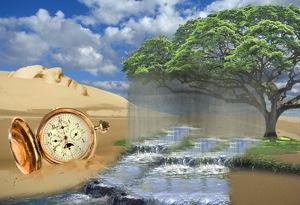Which variety of love do you prefer to listen to — hapless, or timeless? The first half of the final concert of this year’s Festival del Sole in Napa Valley, on July 25, will immerse itself in both, and will require deep breaths.
The concert begins with the luckless kind: two musical settings for chorus and orchestral ensemble by San Francisco composer Gordon Getty, with members of the Russian National Orchestra and the Volti chorus conducted by Carlo Ponti. The second of the two is to Keats’ poem ”La Belle Dame sans Merci,” a ballad about a knight bewitched by a fairy’s daughter who “made sweet moan” with him and perhaps drained his life away. The first, “The Old Man in the Night,” is a setting of Getty’s own poetry based on Keats’ themes (and words) of dangerous, obsessive attraction.

As Robert Geary, artistic director of Volti, told me, just after receiving the scores:
“The Old Man in the Night” describes a discovery of a great beauty and a kind of “unrequited love” theme. ... I think that our job in interpreting it will be to emphasize the storytelling. It’s not contrapuntal; it’s mostly homophonic. We will do extra work to impress inflections that will bring it out in an emotional way.
Following the Getty compositions, Ponti will conduct Peter Lieberson’s settings of five love poems of Pablo Neruda, which he wrote in 2005 for his wife, San Francisco native Lorraine Hunt Lieberson. Married to Lieberson in 1999, the soprano contracted cancer a year later, fought it off, but finally succumbed in 2006 while nevertheless registering rave performances in opera and song during her last years.
Listen to the Music
The set of songs has been one of the most lavishly praised works of the new century. Tim Page, writing for The Washington Post, held nothing back:
The Neruda Songs — a setting of five love poems on deep and wrenching subjects such as passing delight, memory, fear of separation and transcendence beyond death — is one of the most extraordinarily affecting artistic gifts ever created by one lover to another. ... The score is achingly lovely, a genuine mixture of modernism and romanticism that has been sumptuously orchestrated and charged with the same appreciative ripeness that pervades Richard Strauss’s Four Last Songs.

To get a flavor of the music, listen to one of my favorite lines, sung by the late Lorraine Hunt Lieberson, and illustrated here.
Mezzo-soprano Kelley O’Connor is the first person to be chosen by Lieberson to perform the Neruda since his wife’s death. He brought her to Hawaii and taught her one song a day. In an phone interview she told me what a surprise will be in store for audience members who distrust contemporary music:
When you hear that it’s new music, you might think it may not be beautiful or melodic. This music is just so lush, and very tonal and very beautiful and so melody- and poetry-driven that it just doesn’t sound like new music as we think of it. I’m a very lucky girl! The songs are just so personal to me I feel like I’m carrying the torch that was thankfully passed on to me by Peter.
Knowing the background story of Lieberson’s special music, it will be difficult not to feel sympathy for the couple during these lines of the last poem (sung in Spanish): “My love, if you die and I don’t, let’s not give grief an even greater field. No expanse is greater than where we live.”
Then, after an intermission perhaps spent pondering thoughts evoked by the concert’s first half, you can hear Ponti move on to the far more abstract, full-orchestra Symphony No. 7 of Dvořák. This work, considered his best symphony by many, may bring welcome relief: Affairs of the heart can only stop your breath so long, before you need a big gulp of air.

